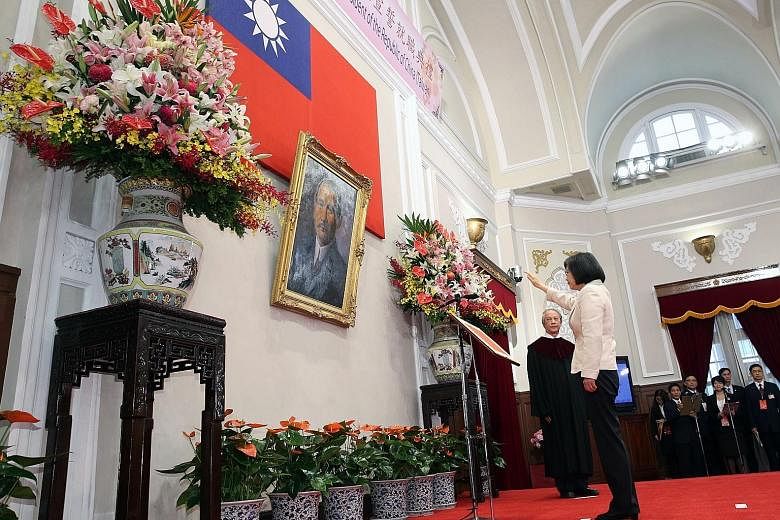There will be "no peace or stability" across the Taiwan Strait should there be a push for independence, China declared in a strong warning to Taiwan, after its new President Tsai Ing-wen failed to mention the 1992 Consensus in her inauguration speech.
Beijing also hinted that exchanges between the two sides' government agencies and semi-official organisations could continue only with affirmation of the one-China principle enshrined in the consensus.
"Today, our resolve to defend national sovereignty and territorial integrity has not changed; our ability has strengthened. We will resolutely oppose any form of moves and plots towards Taiwanese independence and separatism," a spokesman for the mainland's Taiwan Affairs Office said yesterday.
Similarly, Foreign Ministry spokesman Hua Chunying told a routine news briefing that Beijing would persist with the one-China principle and its opposition to Taiwan independence, regardless of the political changes on the island.
Ms Hua added that Beijing would oppose any agreements between other countries and Taiwan that are official in nature or involve national sovereignty, when asked about Ms Tsai's pledge to deepen Taiwan's economic cooperation.
-
New administration's to-do list
-
In her inauguration speech, Taiwan's new President Tsai Ing-wen unveiled her administration's agenda.
Transform economic structures
• Reinforce Taiwan's global and regional connections, ink more bilateral and multilateral free trade agreements and explore economic opportunities in South-east Asia and India to reduce Taiwan's over-reliance on a single market
• Focus on the growth of five industries, including defence manufacturing and green technology, to enhance Taiwan's competitiveness
• Raise productivity and increase wages
Strengthen social safety nets
•Set up a national congress on pension reform to canvass opinions from a diverse group of people, and come up with a reform proposal within a year
•Plug the loopholes in public safety, education, mental health and social work in order to prevent violent crimes
Social fairness and justice
• Set up a Truth and Reconciliation Commission in the Presidential Office to pursue transitional justice, so that the past does not continue to divide Taiwanese society
• Hold a national congress on judicial issues in October to canvass opinions on judicial reforms
• Rebuild and promote autonomous governance of Taiwan's indigenous people, restore their languages and cultures, and improve their livelihoods
Regional peace and stability and cross-strait relations
• Maintain peace and stability in cross-strait ties, in accordance with the Republic of China Constitution and other relevant legislation
• Set aside disputes in the East China Sea and South China Sea to enable joint development.
"On Taiwan's participation in multilateral arrangements, the basis is that it will not result in 'two Chinas' or 'one China, one Taiwan' and that it has to undergo negotiations by both sides," she added.
Before Beijing made its official comments, Chinese state media largely ignored Ms Tsai's inauguration ceremony. Online censors also barred searches for Taiwan and Ms Tsai of the pro-independence Democratic Progressive Party (DPP). A terse two-paragraph dispatch in English by the Xinhua news agency began with "Taiwan's new leader Tsai Ing-wen took office on Friday".
Users on the Twitter-like Weibo portal were allowed to post comments, with some angry that the 1992 Consensus was not mentioned in Ms Tsai's speech.
One user, "gu shi shen zhen", wrote: "Now is the best time to recover Taiwan. The conditions are ideal but it depends whether there's enough guts and vigour."
Analysts say that, despite its tough language, Beijing would have been relieved that Ms Tsai indirectly acknowledged the one-China principle in citing Taiwan's Constitution.
Cross-strait expert Li Fan said Beijing's bottom line was for Ms Tsai to honour the principle though it would have liked an explicit acknowledgement of the consensus.
"Cross-strait ties will thus not deteriorate in the short term. Chinese leaders will be watching carefully whether Tsai's actions will honour the one-China policy," Mr Li, who runs a private think tank in Beijing, told The Straits Times.
The Global Times said in an editorial yesterday that "the DPP resuming office and refusing to acknowledge the 1992 Consensus are becoming key factors that may reverse cross-strait ties".
"If the mainland indulges it, the result could be that all our previous efforts will be lost," it added.

